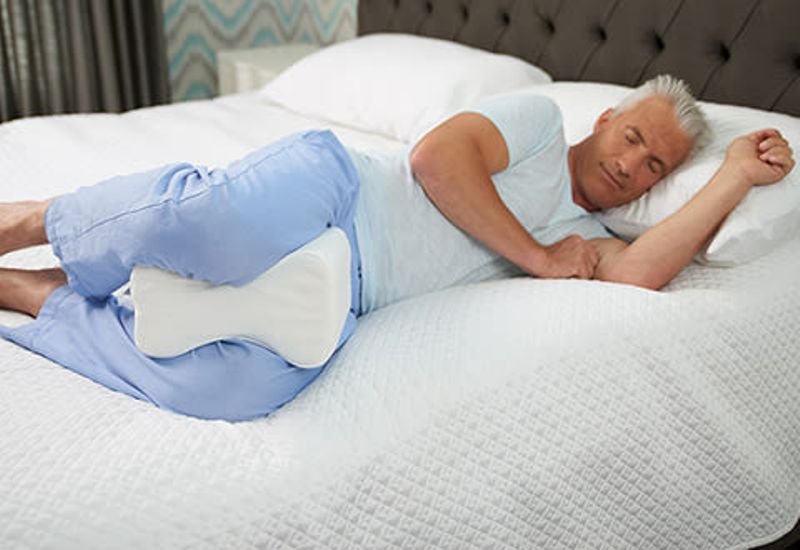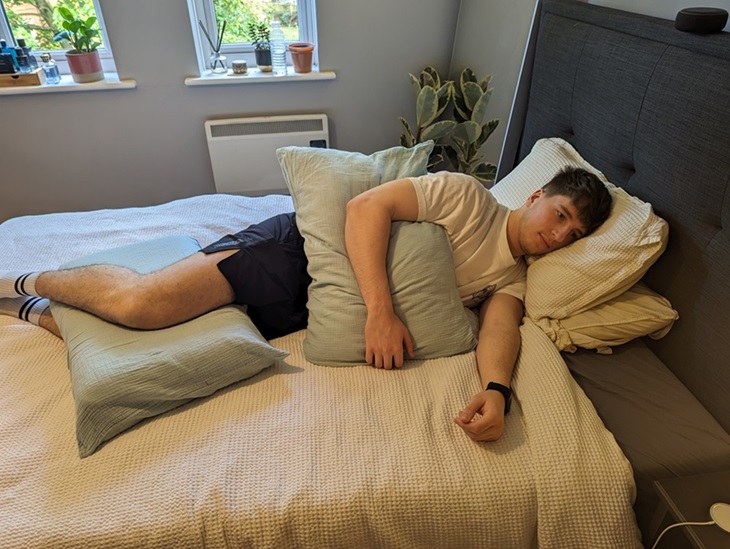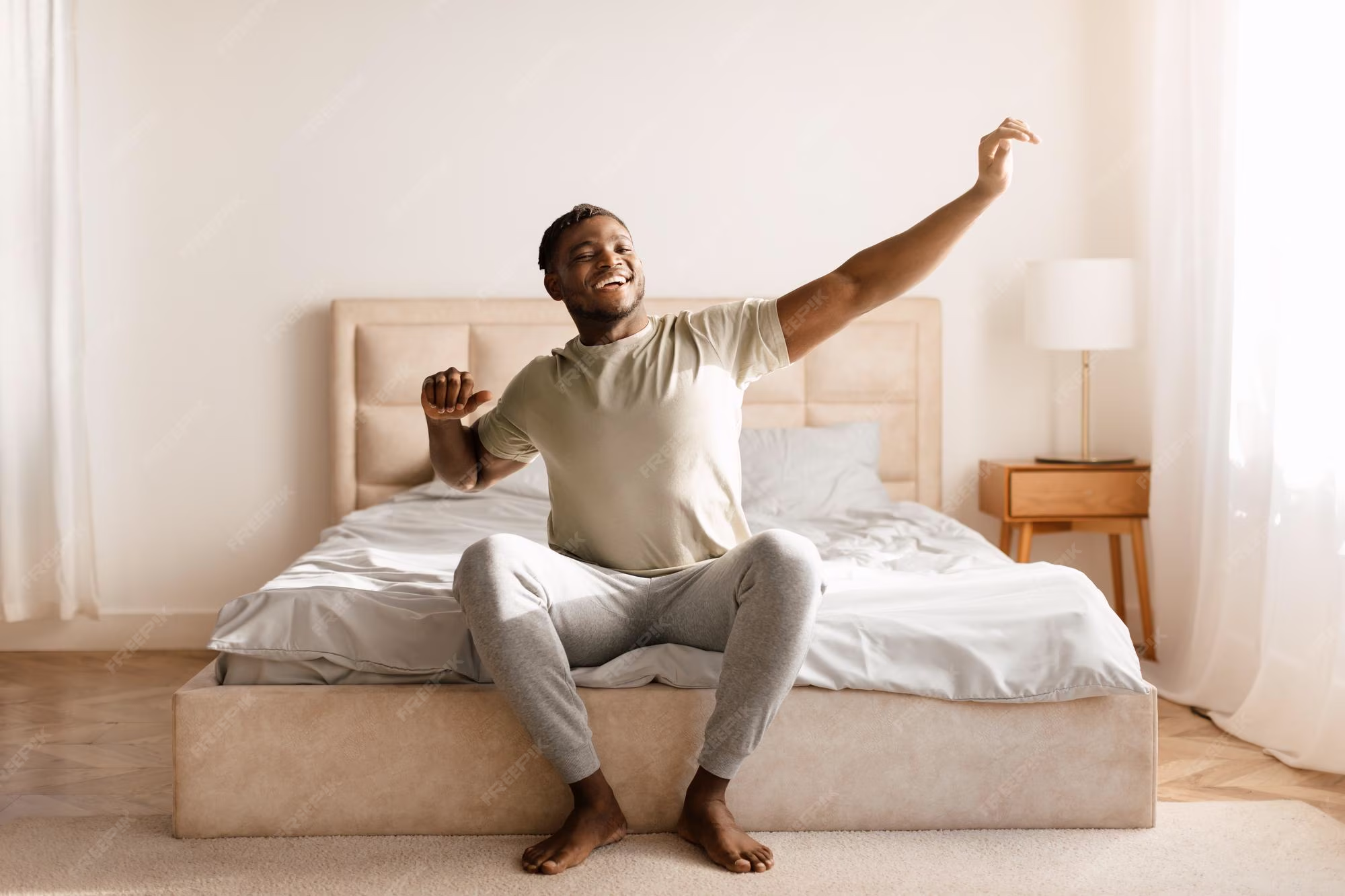TL;DR: Morning back pain usually comes from stiffness, weak deep-core muscles, and sleep posture that overloads the spine. The good news: small daily adjustments fix most cases faster than you think.
Quick Action Plan
- Do a 2-minute morning mobility routine (knees-to-chest + cat–cow) before getting out of bed.
- Switch to a side-sleeping position with a small pillow between your knees to reduce lumbar pressure.
- Strengthen deep-core muscles 3× weekly with beginner exercises like dead bug and glute bridge.
Sources: PubMed: Core stability & low-back pain, PubMed: Sleep posture & spinal load.
If your back hurts after sleep, it’s usually a sign that your spine doesn’t tolerate nighttime stillness or your sleep position as well as it used to. After 40, the lower back stiffens faster, and even a minor imbalance in posture can create tension by the time you wake up. That’s why the first movement in the morning often feels tight instead of comfortable — and this sets up the perfect context for the real reasons we’ll talk about next.
You know what? Most people think the problem is the mattress, but research shows that early-morning lumbar pain is far more connected to overnight immobility and reduced deep-core activation (PubMed). When the spine doesn’t get enough support from the surrounding muscles, it stiffens during sleep — and that stiffness turns into pain as soon as you try to move.
If morning back pain happens regularly, it may also be a sign that your whole recovery cycle is off. Many readers also notice worsened fatigue and heavier mornings overall — I explained why this happens in more detail here: why you wake up tired.
Now let’s break down the real causes, what they mean for your spine, and most importantly — what you can fix today.
Main Reasons Your Back Might Hurt in the Morning
Sleeping in the Wrong Position
The way you sleep matters more than you think. Spending the night on your stomach or twisted to one side puts extra stress on your spine. Over time, that tension can trigger pain. Experts recommend finding a sleeping position that supports back health, such as sleeping on your side with a pillow between your knees.
💬 Speaking from experience: I used to sleep on my stomach for years. It felt comfortable at first, but those were the mornings I woke up with the worst pain. Switching to my side with a small pillow between my legs made a huge difference.
An Old or Unsupportive Mattress
Does your back hurt after sleeping on a hard mattress? Or maybe one that’s too soft? Either way, your mattress could be the problem. A surface that’s too firm prevents your spine from relaxing naturally, while one that’s too soft lets your body sink without support. The best option is usually a medium-firm mattress matched to your body and age (Mayo Clinic).
💬 I learned this the hard way. I slept on the same old mattress for over a decade, ignoring the growing discomfort. Eventually, my back pain became a daily routine. Replacing it with a supportive orthopedic mattress was life-changing—I noticed improvement in just a week.
Not Enough Movement During the Day
When your muscles stay weak from lack of activity, they can’t support your spine properly at night. That’s why morning back pain often shows up in people with mostly sedentary lifestyles. Even a short morning stretch routine can loosen stiff muscles and improve circulation.
💬 I used to spend whole days at my desk with little movement. When my back started acting up, I added just ten minutes of stretching in the morning—and the pain eased dramatically. That tiny change gave me an outsized benefit.
Age-Related Changes in the Spine
Back pain after sleep becomes more common after 40. As we age, spinal discs lose flexibility and ligaments become less resilient. These changes can lead to lower back pain in the morning that doesn’t just “go away” without attention (Harvard Health).
💬 I noticed this shift myself after hitting 40. In my younger years, I could crash on any couch and wake up fine. Now, one night on the wrong surface leaves my back stiff for hours. It was a clear signal: I needed to start taking spine health seriously.
How Back Pain After Sleep Changes After 40
For men, it often comes from lifting and overexertion. For women, hormonal shifts and bone loss play a bigger role. That’s why searches like “lower back pain after sleep in women” are just as common as “in men.”
💬 Personally, I realized I couldn’t handle physical strain the way I used to. In my 30s, carrying heavy bags was no problem. After 40, my back immediately let me know I’d overdone it. Now I’m careful: I spread the weight out and use lumbar support when I need it.

What Helps If Your Back Hurts After Sleep
A Gentle Morning Routine
Start your day with light stretches or exercises for back pain after sleep. Even a few minutes can reset your spine and ease stiffness. The key is to move slowly and avoid anything jerky.
💬 My personal rule: no breakfast until I’ve done my stretches. Five minutes of bending and twisting gently is enough to release tension and help me feel human again.
Choosing the Right Mattress and Pillow
Wondering how to pick a mattress for back pain? Go for something supportive but not rock-hard. Orthopedic, medium-firm mattresses are often best. A pillow should support your neck without pushing it too high or letting it sag (NIH).
💬 I went through three pillows before finding the right one. The difference wasn’t about brand promises—it was about comfort. Now I never travel without a small orthopedic pillow of my own.
Everyday Habits That Make a Difference
If you’re asking, “what should I do if my back hurts after sleep?”, here are some simple daily habits that can help:
- A warm shower first thing in the morning
- Avoiding hours of sitting without breaks
- Keeping your weight in check
💬 I found that whenever I gained a few extra pounds, my back was the first to complain. Staying at a healthy weight turned out to be one of the best forms of prevention.

When It’s Time to See a Doctor
Not all pain is about your mattress or posture. If your back hurts every morning, gets worse over time, or comes with tingling and numbness, it’s time to seek medical advice. After 40, it’s even more important not to ignore these signs.
💬 Once I had back pain that lasted for two weeks straight. I finally saw a doctor, had an X-ray, and learned I had early signs of osteochondrosis. Catching it early meant I could start treatment right away—I was glad I didn’t wait.
Preventing Back Pain After Sleep
- Stay active: walking, swimming, or light workouts help keep back muscles strong.
- Eat smart: include calcium, vitamin D, and protein to protect your bones.
- Practice sleep hygiene: keep a regular bedtime, ventilate your room, and maintain a comfortable environment.
My Personal Experience
To be honest, I used to think my back pain after sleep was just part of getting older. But the truth was simpler — my posture and mattress were working against me. I used to sleep on my stomach for years, and every morning I’d wake up with that same dull ache in my lower back. When I finally switched to sleeping on my side with a pillow between my knees, the difference was huge. Within a week, I was waking up without stiffness. Now I always stretch for five minutes before bed and again after waking up — it’s a small habit that’s kept me pain-free for months.
Related Articles
- Bad Sleep After 40
- Why Do I Wake Up Tired? Causes & Fixes
- How to Stop Waking Up Tired
- Morning Fatigue: Causes
FAQ
Why does my back hurt after sleep?
Most back pain after sleep comes from poor posture, sleeping on your stomach, or a mattress that doesn’t support your spine. Over time, these habits strain the lower back muscles and joints, causing stiffness in the morning.
What is the best sleeping position for back pain after sleep?
The best position is usually on your side with a pillow between your knees. This keeps the spine neutral and reduces tension in your hips and lower back. Avoid sleeping on your stomach, which twists the spine overnight.
Can exercise help reduce back pain after sleep?
Yes. Gentle morning stretches and 20–30 minutes of walking each day improve circulation, relax tight muscles, and prevent stiffness after sleep. Focus on mobility and core strength rather than heavy lifting.
When should I see a doctor about back pain after sleep?
If your back pain lasts more than two weeks, gets worse, or is accompanied by numbness, tingling, fever, or weakness in your legs, it’s time to see a doctor. Early evaluation helps rule out more serious causes.
Can my mattress or pillow really cause back pain?
Absolutely. A mattress that’s too soft or too firm can throw off spinal alignment. Medium-firm orthopedic mattresses tend to work best. Replace your pillow if it lets your head sink too deep or tilts your neck upward.
Final Thoughts
Back pain after sleep is your body’s way of signaling that something needs attention. Sometimes it’s about your position, sometimes your mattress, and sometimes your lifestyle. The good news: you can change all of these. With the right bed, regular movement, and a little extra care after 40, you can wake up feeling refreshed instead of sore.
I’m Roman Kharchenko, founder of Life After 40. I write every article myself, combining my own experience with reliable scientific sources to help people over 40 live with more harmony, energy, and joy.

